The women noted below were hired during the years 1962-83 as full time instructors and many were on the track for tenure. During that same period, there were a number of other women on the faculty as visiting lecturers at the college. Information on the visitors can be found in the archives of Amherst College.
 |
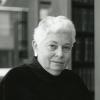 |
Rose Richardson Olver
Ph.D. Radcliffe, Amherst College Honorary Degree, 1973
Field: Psychology and Women's and Gender Studies
Instructor, 1962-63; Assistant Professor 1963-69; Associate Professor1969-1973; Professor 1973; L. Stanton Williams '41 Professor of Psychology and Women's and Gender Studies
I joined the psychology department at Amherst in 1962 after a semester as a lecturer on general education at Harvard. In 1988 after the establishment of the department of women’s and gender studies I divided my appointment between psychology and WAGS offering half my courses in each department. I particularly enjoy the opportunities Amherst provides for teaching courses jointly with faculty members from other disciplines and have taught courses with colleagues from the humanities and natural sciences as well as from other social sciences. Teaching with colleagues from neuroscience, biology and computer science led to the development of a First Year Seminar titled Gender and Science which examines the interactions of biology and cultural constructions in gendered patterns of behavior. My research interests focus on social/cultural factors that influence the cognitive development of young children and the gendered development of men and women across the life span. In the cognitive realm I am particularly interested in how cultural practices affect the development of specific sorts of intellectual skills and have studied the ways in which reading and rereading folk tales affects the child’s understanding of mental representation and its role in mediating responses to external situations. In the gender realm I am especially intrigued by the effects of ethnicity and of experience on the development of gender self concepts. Recent projects with my honors students have examined whether women who enter male domains such as athletics and science experience gender conflict or incorporate “masculine” attributes into their definition of self.
My husband (John Olver) was elected to the U.S. House of Representatives in 1991 after many years of service in the Massachusetts House and Senate. My participation in the community beyond the college has often been structured by the realities of his political campaigns and my interpretation of the politician’s wife role. John and I love to travel and often join with our daughter Martha (born 1969) for family trips that have taken us to Ellsmere and Baffin Islands in the far north as well as to the warmer climes of Costa Rica and the Galapagos.
 |
S. Lowell Eayres
M.A. Boston University
Field: Anthropology
Instructor, 1966-69
Sara Lowell Eayres attended Wellesley College and Boston University before receiving her masters degree from Harvard University. Prior to her arrival at Amherst, she was an instructor in Anthropology at Boston University. In 1996, Ms. Eayres left Amherst College and joined the faculty of the University of Maine at Fort Kent. She became an associate professor of anthropology and sociology and was the chair of the Natural and Behavioral Sciences Division. Ms. Eayres Daigle died in 1996 in Maine and on May 13, 2010, the university dedicated the Lowell E. Daigle Conference Room in the newly renovated Powell Hall on the Fort Kent campus.
Anne Lebeck
Ph.D. Columbia University
Field: Classics
Assistant Professor; 1967-73
Anne Lebeck came to Amherst from Columbia University and had also taught at Hunter College and Swarthmore College. She was the author of journal articles in Greek, Roman and Byzantine Studies and a frequent contributor of book reviews to Classical Philology. She published The Oresteia: A Study in Language and Structure in October of 1971. Ms. Lebeck is deceased. See Memorial Minute.
 |
Annette Barnes
Ph.D. Brooklyn College
Field: Philosophy and Humanities
Visiting Assistant Professor; 1968-70; Assistant Professor 1970-72
Annette Barnes came to Amherst College from Smith College and had taught at the University of Massachusetts at Boston and at Harvard University. In 1989, Barnes was a professor at the University of Maryland, Baltimore County. She has published many books, the most recent, Seeing Through Self-Deception in 1997.
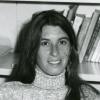 |
Ellen Ryerson
M.A. University of Wisconsin, Ph.D. Yale University
Field: American Studies
Instructor, 1968-70; Assistant Professor 1970-75
I came to the Amherst Department of American studies in the fall of 1968 as an instructor. Until I finished my dissertation two years later, I taught part-time, thereafter adding courses in history and interdepartmental programs. I also served on the Committee of Six and on the Select Committee on Coeducation. With only one or two female colleagues and no female students (except on five-college exchange), this might have been an alienating experience. In fact, it was for me a period of challenge, growth, and satisfaction, for which I will ever be grateful.
In 1974-75, I took sabbatical leave to study at Yale Law School. (My dissertation had been about juvenile courts, and I had taught a course about law and social reform, all without benefit of formal legal study.)
To my surprise, during that year I was offered and accepted a job in the Yale Law School administration, so that I left Amherst without having stood for tenure. I was associate dean of the law school until 1978, when I moved to the central Yale administration as associate provost. In addition to responsibilities for academic units (the college, Law School, Graduate School, schools of Art, Architecture, Drama, and Music, and departments in the Humanities), I participated in making policy concerning the university's budget; faculty hiring, promotion, tenure, and benefits; sexual harassment; and the status of women. In addition, from my perch in the provost's office, I was witness to developments in all the other academic units and on the general university level. It was a great job.
In 1984, however, I decided to go to law school -- something I would probably have done straight from college if I had known any women to be doing that. It was a treat to go back to school (at Yale), to a subject that had interested me so much in other contexts. After graduation, I clerked in Federal District Court in Connecticut and then practiced for a few years.
Not finding practice too rewarding, in 1992 I accepted an offer to work again with the man who had been "my" dean at Yale Law School. I served as associate dean for academic affairs at New York Law School for eight challenging and rewarding years. I then returned to Yale as deputy dean of the Graduate School of Arts and Sciences.
I retired just two years later. Since then, I have been working at painting, studying at a college of fine arts in Connecticut, and showing my work in and around New Haven.
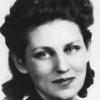 |
 |
Tillie L. Olsen
Field: English
Lecturer, 1969-70
Tillie Lerner Olsen shaped American thinking through art and advocacy. Like Walt Whitman, she sings America, making art out of everyday expressions in all their drive, pungency and variety. Olsen mined her life for her fiction. Her many-times reprinted story “I Stand Here Ironing” comes from her child-raising years, and Tell Me A Riddle (1962) remembers her own and her parents’ generations. Olsen’s interwoven autobiographical stories have the heft of epics. For instance, her friend Al Richmond’s mother, Genya Gorelick, and Olsen’s parents belonged to the Bund, or the Jewish Workers’ Alliance, a clandestine organization based in the Jewish Pale of Settlement in Russia that opposed the czar. Tell Me A Riddle blends their biographies into one account. Olsen’s art honors people demonized and marginalized for “broken” English, too many kids and foreignness. Her genius spliced stories she knew to bits overheard and guessed at, to create original and urgent narratives.
Olsen had a profound influence on American education, an influence that began in many ways from her year at Amherst College in 1969-70. She created a special course: “The Literature of Poverty, Oppression, Exile, the Struggle for Freedom and the Human Spirit.” When she came to the campus ahead of time to see what Amherst was like, she noted that most students, when discussing poverty, would not listen when the few students of color, black and Latino, “tried to tell them that it wasn’t true that one of the characteristics of people in poverty was that they had no real organization and no real family structure, and they talked about the church. Of course they were put down by brilliant quotations from the text.” (This is quoted from a 1988 interview, soon to be published.) “I taught,” she recalled, “not only some of the works that I loved---and almost none of it with the possible exception of Zola, Agee and a few of the Chekov stories (I’m almost a thousand per cent certain) was ever part of what was offered before to students at Amherst.” As she scoured bookstores and libraries for texts, she became aware of the power of the canon, and realized that efforts must be made to challenge it. When she met Florence Howe and Paul Lauter, then teaching at Old Westbury, SUNY—she told them about hundreds of titles. Howe went on to found the Feminist Press; Lauter later edited The Heath Anthology of American Literature (2 volumes) with scores of titles gleaned from Olsen.
Three years after teaching at Amherst, Olsen circulated her “Feminist Studies Reading List” at the 1972 Modern Language Association (MLA) meetings. This list galvanized young, untenured scholars eager for materials to teach in the Women’s Studies programs then in their early stages. They wanted fresh, untapped sources and to do research that would lead to tenured teaching positions. The life-long ravenous, parched reader and once communist organizer met the young generation who needed to hear how to connect political passions and their work-ambitions. American literature courses everywhere still reflect that meeting of minds.
To come to teach at Amherst was wonderful; it was difficult, too. Olsen had done work-day, ordinary jobs for years, leaving her early success in the publishing world behind in order to raise her daughters. She re-entered the writer’s life thanks to a fellowship at Stanford in a program led by Wallace Stegner. After a year at the McDowell Colony in Peterboro, New Hampshire, she was invited by Leo Marx to be Visiting Writer at Amherst. Her husband, Jack Olsen worked as an apprentice typesetter for the Wall Street Journal at their non-union plant in Chicopee. This was insult added to injury, for the pay was bad; he had to work the swing shift; and he set type for “ruling class propaganda” that mocked the hopes of union men and women. It was a terrible come-down after labor-friendly San Francisco.
Widowed in 1989, Olsen lived in her beloved San Francisco until failing health mandated a move to Berkeley, where she made her home with her youngest daughter, Laurie. Olsen died in Oakland, California on January 1, 2007. Submitted by Robin Dizard.
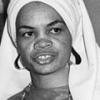 |
Sonya Benita Sanchez
B.A. Hunter College
Field: Black Studies
Associate Professor, 1973-75
Sonya Sanchez joined the Amherst faculty after teaching at Manhattan Community College, Rutgers University, University of Pittsburgh and San Francisco State College. She became a resident poet and a faculty member at Temple University in 1975. Sanchez was a pioneer in the development of Black studies curriculum and is nationally known as an activist. She is a published poet and has received numerous awards.
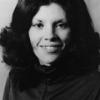 |
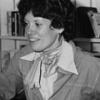 |
Elizabeth Wissman Bruss
Ph.D. University of Michigan
Field: English
Assistant Professor 1972-78; Associate Professor 1978-81
Elizabeth Bruss came to Amherst College from her teaching position at the University of Michigan in 1972. At Amherst, she taught courses in English literature, linguistics and literary theory. She also participated in the Kenan Colloquium, taught a course in the Introduction to Liberal Studies Program and was active in various college and Five College committees. She assumed the chairmanship of the English Department in 1979. Bruss died in May 1981. The Bruss Reading Room in Johnson Chapel was named for her, as was the Bruss Readership. See Memorial Minute.
 |
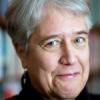 |
Jane Andelman Taubman
Ph.D. Yale, Amherst College Honorary Degree 1989
Field: Russian
Assistant Professor 1973-82; Associate Professor 1982-89; Professor 1989-2010
I began teaching at Amherst in the fall of 1973 after three years at Smith. I was the first faculty member to be appointed part-time tenure track, an innovative arrangement that was intended to attract more women to the faculty. I taught either two or three courses a year throughout my career and retired in June, 2010.
I loved teaching, and taught courses in Russian literature and culture, particularly of the twentieth century, and a seminar on Tolstoy. In the mid-1990s I initiated a course in the history of Russian and Soviet film, one of the earliest national cinema courses at the college. I taught courses in Russian language at all levels, and taught in the ILS course “Perspectives on the Professions.” My original research interests were in Russian modernist poetry of the early twentieth century, particularly Marina Tsvetaeva. My book on Tsvetaeva’s lyric diary was published in 1989, and in 1992 I organized an international conference at Amherst to mark her centennial, co-editing the published volume of contributions.
After an eventful research semester in 1988, living with my family in a two-room apartment in Moscow at the height of perestroika, I wrote Moscow Spring (with Bill Taubman) an account of the rapid cultural and political changes taking place in the USSR. In Moscow, I discovered the work of the contemporary prose writer Liudmilla Petrushevskaya and of the film director Kira Muratova. Both were finally gaining wide recognition due to the new, more liberal cultural policies under Gorbachev. Petrushevskaya came to spend two months at Amherst in 1993 as a visiting writer. My book on Muratova’s films appeared in 2005. After 1991, research trips to Russia became much easier to arrange, and I traveled there much more frequently, including a second semester in Moscow in 2007. During these trips, I participated in Bill’s interviews with Gorbachev and his colleagues in both his native Stavropol and in Moscow, while continuing my research on contemporary Russian film, art and culture.
I am grateful for the opportunity Amherst gave me to lower my teaching load while raising Alex and Phoebe, now parents themselves, and continuing my research and publishing. But department chairing and committee service can not be done part time, of course, and, like most of the Pioneers, I found myself with time-consuming
appointments to major committees beginning early in my career.
I spent my first year of retirement doing a good deal of hands-on grandmothering, as both of my grandsons were born in 2010. Now I am spending more of my time working with Bill on his biography of Gorbachev. It is in some ways a return to my dual interest in both Russia’s history and literature, which was my undergraduate major.
 |
Lois Conchita Grant Beck
M.A., University of Chicago
Field: Anthropology
Assistant Professor 1973-76
Later earned Ph.D. from the University of Chicago
I came to Amherst from a position in the classics department (as a professor of the Persian language) at the University of Massachusetts, Amherst, and the sociology-anthropology department at Mount Holyoke College. I am currently professor of anthropology, and professor of women and gender studies, at Washington University in Saint Louis. I teach courses on Islam and politics, women and Islam, and ethnicity and religion in the Muslim world. Over a span of 40 years, I have conducted cultural anthropological research among the Qashqa’i people of southwestern Iran, who are tribally organized nomadic pastoralists, who speak Turkish, and whose ancestors once lived in the steppes of Eurasia. My books on the Qashqa’i include The Qashqa’i of Iran (Yale University Press, 1986), Nomad: A Year in the Life of a Qashqa’i Tribesman in Iran (University of California Press, 1991), and Nomads Move On: Qashqa’i Tribespeople in Post-Revolutionary Iran (forthcoming). Other books include the coedited Women in the Muslim World (Harvard University Press, 1978), Women in Iran from the Rise of Islam to 1800 (University of Illinois Press, 2003), and Women in Iran from 1800 to the Islamic Republic (University of Illinois Press, 2004). In 1991, my then-five-year-old daughter, Julia Huang, and I traveled to Iran together, and Julia has accompanied me ever since then and has increasingly engaged in her own research activities there. In 2009, just after she graduated from Yale University, Julia published her own book on her experiences among the Qashqa’i. The book, Tribeswomen of Iran: Weaving Memories among Qashqa’i Nomads (I. B. Tauris), was awarded the Latifeh Yarshater Award for the best book on women in Iran published in 2008-2009. Julia was a Fulbright Scholar in Turkey in 2009-2010 and spent the following year in India bringing interns and funding to social businesses and their entrepreneurs. She is currently a Ph.D. student in anthropology at the London School of Economics and Political Science and will conduct her doctoral research on social businesses in India. I was first intrigued by Iran when my father was a Fulbright Scholar there, and Julia has pursued interests that had also drawn the attention of her grandfather and her mother. The three of us have hoped that we could help others to understand Iran, Islam, and the Muslim world better. Catherine Bateson, another Amherst Pioneer, and I have periodically interacted due to our common interests in Iran and anthropology.
I would certainly have enjoyed sharing the upcoming event with women who are current and former Amherst College faculty members. I am attending a workshop in Doha, Qatar, on sectarian politics in the Persian/Arabian Gulf region at about the same time and cannot manage both trips.
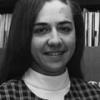 |
Judith Herzfeld
Ph.D. Massachusetts Institute of Technology
Field: Chemistry
Assistant Professor 1973-74
I came to Amherst in 1973, as the first female faculty member in the physical sciences. The fit felt right in that the department of chemistry was interested in my public policy credentials (Kennedy School) as well as my chemical physics doctorate (MIT), the teaching load was research-friendly compared to most 4-year colleges, my all-male colleagues were welcoming and supportive, and my all-male students were generally smart and respectful. But then I did what “everyone” in those days said a woman would do if you hired her, i.e., left to get married (to a guy I had started dating shortly before I left Cambridge and who has since become a professor of chemistry at MIT). The Amherst chemists were very gracious about this U-turn, even inviting my participation in the search for my replacement and choosing to hire another woman (albeit an already married one). A memorable parting experience was the 1974 alumni event where the college president announced that the college would be going co-ed. As a Barnard College and MIT alumna, I was impressed with the care with which Amherst College planned its transition, recruiting female upper class transfer students and admitting enough female first year students to foster co-ed normalcy from the outset. The president also made a point of noting that all-male colleges had been disappearing, except for seminaries and military academies. Nevertheless, eavesdropping on conversations afterward, all I heard from alumni was that those who had sons wanted them to go to the male college that their alma mater had been and those who had daughters wanted them to be able to go to the co-ed college that their alma mater was becoming.
Leaving tenure track (and the bucolic Pioneer Valley) was a bit scary and depressing, but I decided to take advantage of the discontinuity by joining the biophysical laboratory at the Harvard Medical School where I could continue my statistical thermodynamics work while developing an experimental program. That turned out better than expected: after one year I was offered a lectureship, a year later a tenure-track assistant professorship, and seven years later an associate professorship. This long stretch gave me valuable flexibility in bearing and raising two daughters. But, in the Harvard Medical School system, there were still four more years to a tenure decision and the politics of the department two years on were such that I decided to jump ship for tenure in the department of chemistry at Brandeis University, where I have been since 1985.
Other than a turn as department chair and considerable committee work, I have avoided administration, much preferring research and teaching. My group's research focuses on studying how some particularly amazing proteins do their jobs, although we have taken occasional detours into other problems. Looking back, it is interesting to reflect on how projects were born, moved forward, matured and, in some cases, were concluded. A project for NASA was wrapped up in 5 years, while another project for NIH continues after 35 years. Even now, momentum is building in a new theoretical project and a potential new experimental project is in an exploratory stage.
My teaching (since biophysics and physiology at HMS) has ranged from upper level physical chemistry (statistical thermodynamics and quantum mechanics) to introductory courses (general chemistry and first year interdisciplinary seminar). For many years now, I have been teaching general chemistry topics ordered according to a material evolution narrative that hopes to help students appreciate how our material world has reached its current state. I also use active learning methods, lecturing only as needed to clarify or enhance the reading material. For a first year seminar, I chose the topic of determinism (which follows naturally from my work in biophysics) and its implications for (legal) responsibility.
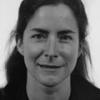 |
Elizabeth Victoria Spelman
Ph.D. Johns Hopkins University
Field: Philosophy
Assistant Professor 1973-80
Elizabeth Spelman came to Amherst College from New York University and had a previous position at State University of New York, Cortland. She is currently professor and chair of the department of philosophy and the Barbara Richmond 1940 Professor in the Humanities at Smith College.
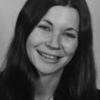 |
Helene Keyssar
Ph.D. University of Iowa
Field: Dramatic Arts
Assistant Professor 1974-79; Associate Professor 1979-81
Helene Keyssar (1943-2001) initially had a one-year replacement appointment in the Drama department for 1974-1975. During that year she produced a main-stage production of Pirandello’s Henry IV and a bilingual production of Beckett’s Endgame in the black box at Fayerweather. Notable in both productions was the acting of Mark Jaster, a freshman who had trained as a mime in Paris. The modernism of both productions was something new for theater at Amherst and led, not without some difficulties, to a regular appointment as Assistant Professor. Helene also published extensively on theater: in her work she sought to bring out what she called the “strategy” of the piece: it led to a class presenting her with a T-shirt inscribed with “I’m Helene and I have a strategy.” Her specialties were theater by African-Americans, feminist theater, and later film, in particular the work of Robert Altman. The combination of publication and production got her tenure in 1977, despite the open opposition of her senior colleague in the department. It was a courageous first for Amherst and a debt is owed to the then president, John William Ward.
Helene was part of a group of five female faculty appointees, appointments that more than doubled the number of women faculty at Amherst. During their first faculty meeting they all sat together, taking seats that unbeknown to them were traditionally occupied by the same (male) faculty members. They were asked to leave on the grounds that students were not permitted to attend faculty meetings. Once that was cleared up, it became evident that a new day had arrived at Amherst when they collectively took off their jackets to reveal T-shirts emblazoned with “Keep abreast of the times.”
She became chair of the drama department and started a program in dance, bringing first the Danny Lewis troupe from New York and premiering a new production by the legendary Anna Sokolow, then developing a faculty position in dance. She was instrumental in the development of Film Studies. A production of The Tempest put several tons of sand on the Kirby stage; another, of Native Son, a massive two story revolving set of a house. As her husband, I joined the faculty on a three-year visiting appointment in 1976; a year later our daughter, Anise, was born and joined our son David.
Helene loved Amherst and would have been happy to remain for the rest of her career. Her (our) friends were many and close. When at the end of my appointment it proved impossible to find me a position in the Valley, I got an offer at the University of California, San Diego. Helene had a sabbatical; we came out not knowing what we might do. During that year she got an offer in the Drama Department and the newly formed Communication Department here. She was instrumental in the development of the Communication Department and became chair of it in 1983. In the middle 1980’s she initiated a program of interactive television programs with the USSR – the first person to do so. These “space-bridges” were of great importance in the process of the opening up of the USSR. In 1990 she was diagnosed with inflammatory breast cancer, a diagnosis that carried a life-expectancy of a year. After a year of intensive and experimental treatment, her cancer was in remission. She spent several years advising the World Bank on what to encourage in the development of television in the post-USSR Russia. In 1999 during what was to be a sabbatical in England her cancer unexpectedly and violently returned. She steadily declined until her death in February 2001.
Written by Tracy Strong, widower of Helene.
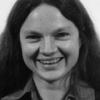 |
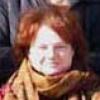 |
Kathleen J. Hartford
Ph.D. Stanford University
Field: Political Science
Assistant Professor 1974-81
For the flavor of what life was like at Amherst for women faculty in the 70s, others’ descriptions capture most of what I could want to say, and there is no point, as the Chinese say, in adding feet to the snake. I left Amherst in 1981, taking advantage of two wonderful opportunities: a two-year postdoc at Harvard, where I got to work with some marvelous mentors and colleagues and broaden my range into work on the political economy of socialist reforms (adding some work on Hungary and Poland to my previous focus on China); and a teaching appointment, at UMass/Boston, which was home base for me from 1983 until 2005. It was a great base: an educational institution that took equal opportunity and equity of all forms truly seriously, where diversity was an everyday reality, and where there was no question that women and men were equals in all our work. I had very much enjoyed my teaching at Amherst and delighted in the interactions with students both in and outside of the classroom. But UMB's environment, especially in the 1980s, was both challenging and exhilarating, with students whose average age was about 25, and who brought a very rich range of life experiences into the classroom with them.
During those years, I spent a lot of time traveling for research, in both Asia and Europe. Beginning in the early 1990s, I spent numerous short and long stints in China, including a year of research sabbatical in 1994 and two years of teaching in Nanjing in 2001-2003 (front seat for the SARS episode towards the end of that time). My research interests, always focused primarily on political economy, evolved along with China's reforms and rapid growth, going from agriculture and rural reforms, to industrial enterprise reforms, to the impact of information technology and the Internet on Chinese society and politics. Somewhat serendipitously (but also influenced by my particular fascination with the Chinese software company that was part of my 1994 research sample), I also began learning more about I.T. and the Internet, and became a little bit of a geek, enough to do a small textbook on using the Internet for politics research and to teach a course on politics in, of, and by Internet--in the computer lab, no less--for several years running.
After 30 years of teaching, I was ready for a change, and when in early 2005 a friend working for the Ford Foundation in Beijing sent the announcement for a program officer position just opening, I decided to try it. In late May I was interviewed, and by mid-September I was ensconced in Beijing, presented with a grants budget for a couple million (US$) per year, and given the responsibility of giving grants for work in governance and public policy, and then keeping track of what people accomplished with it. It’s been nonstop learning: about China and some of the amazing people here in government, academia, nongovernmental organizations and businesses with a social conscience, all striving to improve the opportunities for everyone to benefit from the country's development; about other parts of the world (given the opportunity to interact with colleagues in our many offices outside the US, and to see some of the work their grantees are doing); and about how foundations function. The work in China has been tremendously rewarding, particularly since the refocusing within the foundation since 2008 pointed me towards an emphasis on transparency and accountability. This has made it possible for me to channel support to efforts to improve accountability at the urban and rural grassroots through more effective participatory mechanisms, to extend and fine-tune social security and social protection systems, and to implement the national Open Government Information regulations; and in particular to support innovative work helping rural women, poor villagers, and rural-urban migrants gain access to public services and public resources. This doesn't all take place in the office: the work means being on the road about half the time – attending conferences, visiting project sites, meeting with people who want to try out new ideas, and taking grantees on study visits. In the past couple of years I have also been drawing on user-centered work in information and communications technology to help grantee organizations use new technologies to improve their communications about their work.
The travel has allowed me to indulge an increasingly obsessive interest in photography. There hasn't been time for many other spare-time pursuits or for writing, but plenty of ideas are percolating about what to do once my term in China ends in 2013.
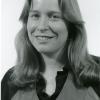 |
M. Rachel Kitzinger
Ph.D. Stanford University
Field: Classics
Assistant Professor 1974-80
I came to Amherst in 1974 directly from graduate work at Stanford University. Joan Dassin and I had both studied at Stanford and, although we did not know each other, decided to share a faculty apartment at Amherst. One of the defining features of my years at Amherst was the strong friendships that developed among the women who were hired to prepare the college for co-education, as well as the women who were already on the faculty. During the six years I taught in the classics department I explored the subject of my dissertation --language as a means of characterization on the stage of Sophoklean tragedy--, in part by directing productions of Greek tragedy in Greek. Students in the classics department participated in these productions, allowing me to combine teaching and research in a way that I considered invaluable both for me and for my students. These students were fantastic, and I remain deeply grateful for their energy, dedication, and sense of intellectual adventure.
After resigning from Amherst in 1980, I worked in a bookstore, wrote, taught in various places, and owned and ran a bar on the Greek island of Paxoi, until I went to Vassar in January 1982 to teach for a semester in the classics department there. That semester has turned into 30 years. I have continued to work on Sophoklean tragedy, always trying to understand how the plays worked in performance and how thinking of them as performed texts changes what we can now only read. Most recently I have published a book on the choruses of the Antigone and the Philoktetes and a translation of the Oedipus at Colonos, which my partner,the poet Eamon Grennan, and I wrote together. In 2006 I directed a production of our translation, the first time I had done a production of a Greek tragedy in English. Although I loved teaching and writing, I found myself drawn to the idea of balancing the isolation of a scholar's life with participation in the Vassar community as an administrator. I had also come to feel that it was too easy for faculty members to complain about an institution without taking on the responsibility to try and change it. The most recent position I have held in the administration is dean of planning and academic affairs. I will return to teaching in the spring of 2012 and will then enter Vassar's phased retirement program.
Eamon, who is Irish, and I spend as much time as possible in our cottage, Ait Eile (Another Place) on the west coast of Ireland. Our daughter, Kira, and Eamon's two older children, and now their children, are also deeply attached to the place and come as often as they can when we are there in the summer. There are surprising similarities between Ireland and Greece, and I feel almost as much at home there as I do in Greece. Eamon and I plan to work on another translation and will be able to do so in Ireland for longer periods of time when I retire. My worlds came together in a striking and interesting way this summer, when I found myself reciting Sappho in ancient Greek in our local pub.
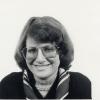 |
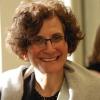 |
Joan Rosalie Dassin
Ph.D. Stanford University
Field: English
Assistant Professor 1974-81
In 1974 I started my academic career as a young assistant professor in the English department at Amherst College. I had just completed a Ph.D. in Modern Thought and Literature at Stanford, with a dissertation on politics and culture in Brazil. My intellectual trajectory probably didn’t make much sense to my English department colleagues, but my years at Amherst—where I taught until 1980—launched me on a career path I have traveled until today.
In my Amherst days, along with other junior colleagues and kindred faculty from Smith and UMass, I tried to expand the traditional male, Anglo-Saxon literary canon and developed courses in Latin American literature, film, women’s literature and other unheard American and international voices. Heavily influenced by the abuses of military dictatorships in South America, I became interested in forms of resistance expressed through literature and culture. Engagement with the international human rights movement followed, and as countries in Latin America edged toward the return of civil and political rights, I was drawn to the study of poverty and inequality—a suppression of underlying economic and social rights.
These intellectual and international interests have driven my professional choices for the past thirty years. After my first two years at Amherst, I accepted a Fulbright grant to teach women’s studies and contemporary American literature in Brazil. Between 1983 and 1988 I was the staff associate for Latin America at the Social Science Research Council in New York. Between 1988 and 1996 I worked at the Ford Foundation, first as the representative for the Foundation office in Brazil and subsequently as the regional director for Latin America, based in New York. Over these years I held two additional Fulbright grants for teaching and research in Brazil, along with other grants for research related to that country’s long struggle for democracy.
Since 2000, I have held a dream position as executive director of the Ford Foundation International Fellowships Program (IFP). The program supports graduate-level study in a broad range of fields related to economic, social and cultural development. It aims to broaden access to quality higher education for members of marginalized and excluded groups in developing countries, enabling them to contribute the world’s best knowledge and ideas to the struggle for development and social justice. More than 4,300 Fellows from 22 countries in Asia, Africa and Latin America have benefited from the IFP, the largest single program in Ford Foundation history.
For me, the last decade has been an unparalleled opportunity to put my ideas about the ideal role of higher education as a force for social justice into practice on a worldwide scale. Drawing on my academic background, regional expertise and international experience, I have been able to develop and lead a highly innovative and successful program that truly puts knowledge and education at the service of societies in need of deep structural transformation.
IFP is in the wind-down phase and will conclude in 2013. What comes next? I’m considering various options and will certainly pursue my core interests in culture, politics and social change. On the personal side, I’ll continue to cherish my 21-year-old son, Andre (a fourth year architecture student at Boston Architectural College), and enjoy the multiple delights of living in the heart of Manhattan’s Upper West Side. Not the least, I’ll continue to marvel at my good fortune in forging a professional path that began at a small New England college and led to the world at large.
 |
 |
Susan Judith Lewandowski
Ph.D. University of Chicago
Field: History
Assistant Professor 1974-81
I joined the Amherst College faculty in 1974 as an assistant professor of history excited about my first teaching position. Prior to this time, I had spent two years in England and India doing post-doctoral research on the history of Madras City under the auspices of the American Association of University Women. The University of Chicago had awarded me a Ph.D. in South Asian History and Anthropology in 1972, and research monies from the Social Science Research Council and the Ford Foundation funded several trips to India in support of this degree.
Like many of my colleagues who had recently arrived at Amherst, I taught courses that were somewhat non-traditional such as Scarcity and Plenty in History, The City in Evolution, Contemporary India, and Race and Sex in America (a Freshman Seminar). Since research was very important to me, I also published a book and ten articles. At the same time, I acquired considerable administrative experience as chair of the Asian Studies Program, member of the Committee on Educational Policy and the College Council.
This stood me in good stead for the next phase of my career. In 1981, I spent the year as a research sssociate in the Special Program for Urban and Regional Studies of Developing Areas at M.I.T. with architects and planners from all over the world. My son, Shaen, was then two years old under the care of my British husband as I commuted back and forth from Amherst to Cambridge, MA. I gave considerable thought to pursuing a career in Washington or New York City in an international field, however, I knew that I would have only one child and by then my husband and I were moving toward a separation.
Instead, given the dearth of jobs nationally in my field, I drew a hundred-mile radius around my house in South Amherst and moved into academic administration in 1982. John and I co-parented Shaen giving us the opportunity to play a real part in our son’s life. My first position in administration was as director of grants for foundations and corporations at Hampshire College. Since the development office was adjacent to the president’s office, I learned a great deal about how a small college operated. However, after several years I missed working with students and took a position at Hartford College for Women as director of admissions that put me in contact with the student body. I also sat on the President’s Council helping to make decisions about the governance of the institution.
Four years later, Shaen was a pre-teen and I was tired of the commute to Hartford. Between 1988 and 1997 I worked in the admissions office at Smith College in charge of their alumnae admissions program, giving me the opportunity to travel both nationally and internationally. I was also made an adjunct member of the faculty and taught a course on Modern Indian History.
Then in the fall of 1997 I moved to Los Angeles where I ran a college counseling office at the Marlborough School, one of the two best private schools in the city, and sat on the Senior Team that helped manage the school. In addition to the facilities and resources of a small college and a very talented faculty, Marlborough also had a parent body with very high expectations. I often say that working with the Los Angeles Alumnae Club of Smith College trained me for this job. Parents included Steven Spielberg, Neil Simon, John Lithgow, David Caruso and so on. All my past experience in administration was useful in this position, in particular, the fund-raising I had done at Hampshire College. I was also able to attend South Asian events through my affiliation with U.C.L.A., and Marlborough funded me to return to India for a brief research trip in 2000. For a few of these years, I taught a comparative world religions class. Sticking to my passions enabled me to create a fulfilling life. In 2009, I retired in Amherst to be near friends and family on the East Coast, but I can usually be found in Los Angeles in the winter months.
 |
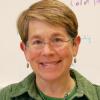 |
Lila Gierasch (Pease)
Ph.D. Harvard University
Field: Chemistry
Assistant Professor 1974-79
I joined the Amherst faculty directly from graduate school in Biophysics at Harvard, and right before the school decided to go coeducational. I was one of six women faculty hired that year, and recollect the ‘caper’ involving tee shirts and the faculty meeting where the faculty voted in support of coeduation: “Get abreast of the times, vote ‘YES’”. [I still have the tee shirt!] In addition to launching a research program in biophysical chemistry of peptides and proteins with keen Amherst undergraduate researchers, and teaching many different classes in chemistry and biochemistry, I coached the inaugural Amherst women’s cross-country team and the riding club. While at Amherst, I met Jean-Marie Lehn, who would go on to win the Nobel Prize in chemistry. After my first three years at Amherst, I decided to spend a sabbatical year in Lehn's laboratory in France. Together with my desire to expand my research program and mentor graduate students and postdoctoral fellows, the year of focused research in France led me to a decision to leave Amherst and move to an institution with a graduate school. This decision was not taken lightly, as I went to Mount Holyoke and greatly value the small undergraduate college experience. I spent eight years as a chemistry professor at the University of Delaware, then moved to the department of pharmacology at the University of Texas Southwestern Medical Center as the Robert A. Welch Chair holder (the first woman Welch Chair and youngest ever at that time) for the next six years. Returning to my roots in the Pioneer Valley in 1994, I have since been at the University of Massachusetts, Amherst, first as the chair of the chemistry department (94 to 99) and then as chair of the Biochemistry & Molecular Biology Department (99 to 05), and happily now without major administrative duties. My NIH supported research lab has a number of postdoctoral fellows, graduate students, and undergraduates in training, and together we continue to study protein folding, most recently in vivo, including the origin of folding defects that lead to many diseases such as Alzheimer’s and Parkinson’s. My interest in protein folding began with my undergraduate research at Mount Holyoke College, carried out under Ed Weaver’s guidance.
 |
 |
Marguerite Waller
Ph.D. Yale University, Amherst College honorary degree 1989
Field: English, Women's Studies
Assistant Professor 1974-81; Associate Professor 1981-89; Professor 1989-91
I moved from New Haven to Amherst in 1974 on the day that Richard Nixon resigned as President of the United States. It was not true, as Roger Mudd tried to convince us, that everyone in America was deeply saddened by this moment. The friends and family who had helped me move and I broached a celebratory bottle of champagne.
Though we knew that these were times of great dissension and turmoil, those of us who arrived at Amherst in the mid-seventies had no way of foreseeing what we would gain, what we would lose, what we would learn, and where we would go with our particular experiences. I was 26 and naïve about institutional politics, but I had eight years of student activism at Cornell and Yale behind me, so I assumed that struggle, debate, and social change were the way of the world. I had not reckoned that the political issue in my new job would be my own cohort of colleagues and the introduction of women students. Discovering that I had become the object rather than the subject of political debate was a shock, which, along a learning curve that has included many bumps and hairpin turns, has led me to appreciate just how abruptly and utterly social identities may change--a realization that many of my senior male colleagues were, no doubt, also wrestling with.
This discovery has become something of a leitmotif in my research and teaching. I cross borders, investigating the consequences of drawing national, disciplinary, theoretical, gender, temporal, and other kinds of frames and trying to make accessible the richness of the spaces to be discovered between them. Not coincidentally, I shifted my research focus from Renaissance literature to film and women's studies, using a Fulbright to France, a sabbatical in New York City, and a grant from the Woodrow Wilson Foundation to make the transition.
Another Fulbright grant, this one to Hungary in the early l990s, put me in contact with an astonishing group of anti-nationalist, anti-war feminists working hard throughout the region of former Yugoslavia to understand and alert the world to the gendered violence occurring in the Balkans. They were also devising and implementing innovative ways of aiding the women survivors of this violence.There and over the two weeks I spent at the NGO Forum paralleling the Fourth U.N. Conference on Women in Beijing, China in l995 (where I met many of my friends from Eastern Europe), my direction took a new turn. Since then, my work in both cinema and women's studies has focused on feminist dialogue across differences and borders of many kinds. What blocks it; what enables it; how it works differently from conventional modes of knowledge production.
At U.C. Riverside, where I have a joint appointment in Women's Studies and Comparative Literature, I organized a major international conference—Frontline Feminisms: Women, War, and Resistance—at which 162 activists and academics from 27 countries were able to meet and interact, and two years later I convened a fourteen-week research residency at the University of California Humanities Research Center during which a transnational group of feminists came together to experiment in very specific terms with the generativity of epistemological difference.
Along the way, I have co-edited several volumes that put activist and academic feminisms from the global "south" and "north" in dialogue, including Frontline Feminisms: Women, War, and Resistance; Dialogue and Difference: Feminisms Challenge Globalization; and The Wages of Empire: Neoliberal Policy, Repression, and Women's Poverty. Paralleling and now converging with these pursuits, films from around the world have kept me oriented, and I have just completed a volume on postcolonial cinema studies.
Since l998, I have also been raising my daughter Lea, who, fortunately, loves to travel and loves film. She had seen all of Fellini by the time she was seven, spent her fifth grade year with me in Rome where I directed the U.C. Rome Program, and is extravagantly spoiled by my graduate students in comparative literature. When she enters Santa Monica High School this fall, I expect to encounter new frontiers of epistemological difference.
 |
 |
Elizabeth Joan Aries
Ph.D. Harvard University
Field: Psychology, Amherst College honorary degree 1989
Assistant Professor 1975-83; Associate Professor 1983-89; Professor 1989
I spent two years as an assistant professor in a research position in the department of psychiatry at Yale before joining the faculty at Amherst in 1975. My experience at the college was dramatically different from most other women who joined the faculty back then. I had the great good fortune to join Rose Olver in the psychology department, and thus was the only woman at that time who had a senior woman mentor in her department.
Until the mid-1990s my research and writing centered on gender and communication, i.e., on differences in the interaction styles of men and women, on how the sex composition of a group influences men’s and women’s use of language and the things they talk about. My interests then shifted race and social class. I’ve been working on a longitudinal study of 58 students from the class of 2009 that looks at the race- and class-related challenges they faced on campus and what they have learned from diversity in the student body. The students were drawn from four groups: affluent white, affluent black, lower-income white, lower-income black.
The courses I currently teach concentrate on the period of adolescence and the complexities of the transition to adulthood in contemporary American society. Beyond my departmental teaching, I have been teaching a first year seminar, Growing Up in America, for 15 years with Carol Clark. In that course, we examine the ways in which race, social class, and gender shape the experience of growing up in America through readings from history, psychology, sociology and literature. I have loved the interdisciplinary perspective of the course and teaching freshmen in a small seminar. For more detail on my academic life at the college see my college website.
My husband, Richard Berman, and I have two children, Josh (born 1980) and Anna (born 1983). They attended the Common School, a wonderful, small progressive elementary school here in Amherst. I have been very involved in the school over the years. When my children were there I did everything I could to be of help – I served on their board of trustees, chaired the board, chaired their annual fund and chaired their search committee for a new director. I love crafts, and when time permits I spend my free time doing ceramics, quilting, and Ukranian egg decorating.
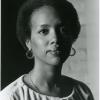 |
 |
Andrea Benton Rushing
Ph.D. University of Massachusetts, Amherst, Amherst College honorary degree 1987
Field: Black Studies and English
Visiting Assistant Professor 1975-76; Assistant Professor 1976-80; Associate Professor 1981-87; Professor 1987-2011
Professor Andrea Rushing recently retired from Amherst College after holding a joint appointment in English and Black studies with a focus on poetry and autobiography. In poetry she was especially interested in the intersection between African American music and African American poetry, and the ways in which oral literature makes its way into written poetry. Her special research interests focused on Yoruba culture and cosmology.
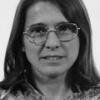 |
Barbara Kimball Ansbacher
Ph.D. University of Cincinnati
Field: Music
Assistant Professor 1975-82
Barbara Ansbacher taught at Bucknell University, Colorado College and the College-Conservatory of Music at the University of Cincinnati before joining the Amherst College faculty. She authored several publications and was a member of several symphony orchestras. Ansbacher left Amherst to direct the Mohawk Trail Concert series in 1982. She died in August 1987 at her home in Amherst, Mass.
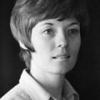 |
|
Helene L. Scher
Ph.D. Yale University, Amherst College honorary degree 1983
Field: German
Associate Professor 1975-83; Professor 1983-87
I became a member of the German Department at Amherst College in 1975 after teaching at Yale University, Southern Connecticut State College, City College of CUNY and Fairfield University (CT). My early professional years included marriage to fellow graduate student Steven Paul Scher and confronting first-hand the now outmoded anti-nepotism rules in academia which prevented husband and wife from teaching in the same academic department. My early experiences proved to be valuable preparation for the challenges I encountered at Amherst, though my marriage did not survive. At Amherst I initially thrived, teaching German language at all levels, German literature - primarily 20th century -- and German culture and history, and eventually serving as chair of the German Department. At Amherst I also enjoyed teaching interdisciplinary ILS courses with colleagues from different departments. After attending seminars on East Germany and spending a summer in Weimar, East Germany, I became interested in East German literature and on the contrasting styles and themes of East and West, which became the later focus of my classes and research.
Born and bred in New York City, I became restless in small town Amherst and took what I expected to be a temporary position as program officer for the U.S. Department of Education’s Fund for the Improvement of Postsecondary Education (known as FIPSE) in Washington, DC. In this new position, I provided programmatic, administrative and fiscal oversight for grants supporting innovative projects to improve teaching and learning in postsecondary education. The projects I monitored included Women’s Studies, Teacher Education, New Methods of Language Learning, as well as improvements to legal and medical education. I liked living in Washington and decided to remain in the city even after losing my government job after 7 years due to down-sizing. Unable to find full-time work in my profession and too young to retire, I then supported myself with a variety of part-time positions. I taught German at several language schools, became active as a freelance translator and for the past 16 years have worked part-time for an airline. This last move should come as no surprise to those who recall that I fulfilled a childhood dream while at Amherst and earned my pilot’s license. I continue to enjoy working for the airline and doing translation. Personal interests include travel (airline benefits!) and classical music.
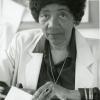 |
Mavis C. Campbell
Ph.D. University of London, Amherst College honorary degree, 1983
Field: History
Associate Professor 1976-83; Professor 1983-2006
Mavis Campbell joined the Amherst College history faculty in 1976. She has had held positions at the City University of New York, Hunter College, University of Sierra Leone, Fourah Bay College, University of Guyana, University of Edinburgh, University of Cambridge and Wolfson College. She published a number of books, the most recent being, Black Women of Amherst College in 1999. Professor Campbell, emerita, retired in 2006.
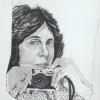 |
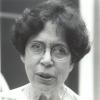 |
Oriole Horch Farb (Feshbach)
M.F.A. University of Massachusetts
Field: Fine Arts
Visiting Assistant Professor 1977-78
As visiting professor of fine arts, I was the first woman to teach in the then small Amherst College art department in 1977. It was my first teaching job other than teaching varied courses as a grad student and afterwards at the University of Massachusetts in Amherst. Wherever and whenever I taught in the valley I had women from the five colleges in my classes as there were few women teaching studio art at that time.
I studied mainly painting and art history at Sarah Lawrence College while having an internship at The Museum of Modern Art in New York City. I then directed the Riverside Museum in New York City for eighteen years where the first exhibit I co-curated was a women’s exhibit.
I am presently at work on my fourth book: images for a long poem by HD (Hilda Doolittle). The poem is the first part of her trilogy called “The Walls Do Not Fall.”
Other exhibitions connected to Amherst College as an artist, besides my faculty exhibit at Mead Art Museum in 1979 called “Valley People,” were a group exhibit “Parallels:Artists/Poets” arranged by Daria D’Arienzo at the Robert Frost Library in 1994; an exhibition called “Language as Object” in 1997 with my image for a poem by Amy Clampitt; and an exhibit curated by Judith Barter, “Women Artists, 1600-1980: Selections from Five College Collections” in 1980.
 |
 |
Deborah B. Gewertz
Ph.D. City University of New York, Amherst College honorary degree 1988
Field: Anthropology
Assistant Professor 1977-83; Associate Professor 1983-88; Professor 1988; G. Henry Whitcomb 1874 Professor of Anthropology
When I dropped out of Queens College to accompany my then-husband to his graduate program at Princeton University, I soon got bored doing nothing.I entered Princeton as a "special student" (women were not yet formally admitted) and was able to transfer credits back to Queens to complete my degree. After having a baby, I went back to school, part-time at first, working toward a Ph.D. in Anthropology. Focusing my thinking on anthropological approaches to economic and political change, I traveled to the soon-to-be independent Territory of Papua New Guinea. My daughter loved it there. My then-husband did not, a fact we could not overcome. And, I finished the thesis research which eventually became Sepik River Societies: An Historical Ethnography of the Chambri and their Neighbors (Yale, 1983). Considered innovative in its deconstruction of ideas of "group" and "people," Sepik River Societies examined regional integration among those living in the East Sepik Province (already well-known because both Margaret Mead and Gregory Bateson had worked among them). My book (and probably the Mead and Bateson connection) proved a key factor in my earning tenure at Amherst College, where I have taught since 1977.
Over the years, I returned to Papua New Guinea many times.This research resulted (so far) in six major books (in addition to Sepik River Societies), two edited volumes, and forty-seven articles. Most of these books and edited collections have tried to convey “thickly" how and why people engage and contest with one another in cross-cutting, changing, and contingent manners: whether or not as kin, as tribal affiliates, as comparably gendered, as co-religionists, as commonly cultured, as similarly socially classed – and, with my last two projects, as first and third world fellow consumers. Six of the books and many of the articles were written with Frederick Errington, my (present) husband, best critic, and great love. In addition to research and writing about anthropological issues, I have held editorial posts, won academic honors, and accepted visiting appointments (including six weeks in Paris at the École des Hautes Études!) And I have taught mightily – and, perhaps, well.
 |
Christine Dorothy Zampach
M.Ed. Springfield College
Field: Physical Education
Assistant Professor 1976-80
Christine Zampach came to Amherst College from Lake Forest College in 1976. She had held positions at the University of Wisconsin at Stout and the State University of New York at Cortland. She received degrees from the University of Wisconsin at LaCrosse and Springfield College.
Priscilla H. Hunt
Ph.D. Stanford University
Field: Russian
Assistant Professor 1977-81
Priscilla Hunt joined the faculty at Amherst College in 1977 as a professor in the Russian department. She previously taught at the University of British Columbia and Stanford University. She has also taught at Hampshire College, Harvard, Brown and Columbia Universities, Smith College and the University of British Columbia in Vancouver. Most recently, Hunt was with the Department of Slavic and East European Studies at the University of Massachusetts, Amherst. Hunt directs us to her website for her research interests.
 |
 |
Elizabeth Jane Garrels
Ph.D. Harvard University
Field: Romance Languages, Spanish
Assistant Professor 1977-79
I left Amherst after two years, and have spent the rest of my career in Foreign Languages & Literatures (FL&L) at MIT, receiving tenure in 1985 and promotion to full professor in 1997. When I arrived at MIT in the fall of 1979, FL&L was a fledgling academic unit, so almost from the beginning, I was involved in building our multi-language undergraduate program into one of the two most popular undergraduate concentrations at the Institute. Last year we taught 2500 students, roughly 35% of the undergraduate population. Currently Humanities at MIT, the department to which FL&L belongs, is undergoing reorganization, and soon FL&L may cease to exist in its present form. For this reason and others, it is a good time for me to retire, and this will be my last year of full-time teaching. I will then mix two semesters of teaching with several of leave and fully retire at the end of December, 2014.
After six years of sustaining a cross-country relationship with a Ph.D in English from U.Mass, Amherst (romance was abloom during those two years in the Happy Valley), I and my husband, as of 1982, came to share the same household in 1986 in Lexington, Massachusetts. He soon landed a job at MIT, so from famine we passed to plenty, and have both enjoyed our long and very challenging but stimulating careers on the same campus. At the time I got tenure, no female faculty on the tenure track at MIT had given birth to a child while untenured and then been awarded tenure afterwards. Women tenured faculty with children either had them before arriving at MIT or after receiving tenure. I had my son, David, when I was 43 and four years past my tenure decision. He is now 22 and about to graduate from Wheaton College,* and during his lifetime, things have fortunately gotten much, much better for young women faculty at MIT wanting to start families before coming up for tenure.
I have always loved teaching, and have loved as well the intellectual growth and excitement that have come from MIT's relentless pressures to publish and to be active in ones discipline at large. I am extremely grateful to MIT for jumpstarting me into a career of rewarding scholarship and for stimulating me to evolve and grow continually as a teacher. I thank the example of my colleagues in FL&L (especially the talented lecturers) and the brilliance and infinite curiosity of my students for the latter.
As higher education evolves in this country in several disturbing ways (not to mention the budget cuts that administrators justify by pointing to the country's poor economic performance), I am sadly starting to feel like a dinosaur, both as someone committed to teaching upper-level literature and culture courses in Spanish (as opposed to English) and as someone committed to inter-disciplinary teaching but first and foremost to the teaching of literature and how to read critically. I am hoping that retirement will give me the needed time to study and reflect upon, more in depth than I can now, the extraordinary changes taking place in the world, and to argue for the crucial role of the humanities and foreign languages in education.
If you want to know more about my scholarly work and publications, please consult the People and Publications pages on MIT's FL&L website.
*Please note that we chose to send our son to a four-year liberal arts college. It has been wonderful for him, and I am more than ever convinced of the strengths of this educational model.
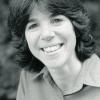 |
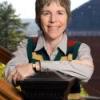 |
Susan Niditch
Ph.D. Harvard University, Amherst College honorary degree 1990
Field: Religion
Assistant Professor 1978-84; Associate Professor 1984-90; Professor 1990; Samuel Green Professor of Religion 1992
I have taught at Amherst for more than thirty years, virtually my entire career, and am beginning to see the children of former students in my classes! I did my undergraduate work in an unusual interdisciplinary, comparative literature program at Harvard that dealt with early and oral literatures, my own area of specialization being the literatures and cultures of ancient and early Judaism. My doctoral work, also at Harvard, was in ancient Near Eastern languages and civilizations, and my own research while at Amherst has been in a variety of areas including portrayals of war and violence in the Hebrew Bible, the study of biblical literature as traditional-style literature that can fruitfully be compared to the folk and epic traditions of other cultures, and questions pertaining to gender and the body in ancient Israel. I am currently working on a new book dealing with personal religion in late biblical literature, an analysis that draws on recent trends in the study of religion under the headings of “religion as lived” and “material religion.” Scholars have become increasingly interested in the nature of everyday religion, in what ordinary people do and think religiously, and in the ways in which each of us experiences and shapes religious identity, both within and apart from forms of official religion. My research has always informed my teaching at Amherst and vice versa. Nothing is ever too technical to present to students once it is unpacked and translated, and although few of my students can read the classical sources we study together in the original languages, their intelligence, creativity, and instincts make up for a lot. I have been tempted to move on from time to time, but enjoy my colleagues, students, and the town itself too much to leave. Amherst has become a more welcoming environment for women than it was in the late 70s when I arrived. I often find it surprising nevertheless how much contemporary students take for granted about issues in gender. My husband, Robert Doran, and I have been incredibly lucky to teach in the same wonderful place, and our two daughters thrived growing up in the Valley.
 |
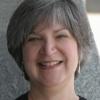 |
Laura Jane Wexler
M.Phil., M.A. Columbia University
Field: American Studies, English
Assistant Professor 1977-85
Later earned her Ph.D. from Columbia University
Laura Wexler is professor of American studies; professor of women’s, gender and sexuality studies; and director of the Photographic Memory Workshop at Yale University. She is affiliated with the Film Studies Program; the Program in Ethnicity, Race and Migration; the Program in Judaic Studies; and the Public Humanities Program, all at Yale. She chaired the Women’s, Gender, & Sexuality Studies Program from 2003 to 2007 and co-chaired the Yale Women Faculty Forum from 2008 to 2011.
Wexler is the recipient of major grants from the National Endowment for the Humanities, the Henry R. Luce Foundation and The Whitney and Betty MacMillan Center for International and Area Studies at Yale, among others. Her book, Tender Violence: Domestic Visions in an Age of U.S. Imperialism, won the Joan Kelly Memorial Prize of the American Historical Association for the best book in women’s history and/or feminist theory. She is co-author, with Sandra Matthews, of Pregnant Pictures; co-editor, with Laura Frost, Amy Hungerford and John MacKay, of Interpretation and the Holocaust; and co-author, with James McIntosh, et al., of The Puritan Imagination in Nineteenth-Century America. Currently she is completing a monograph entitled The Awakening of Cultural Memory: Mapping Kate Chopin, using historical photographs in the mode of an “extra-illustrated book” to challenge white supremacy in the formation of contemporary American feminist reading practices and canon formation. She is composing a volume of essays entitled The Look, the Gaze and the Relay Race: Photography and Everyday Memory, addressing the transmission of memory in the American Century. Wexler has served on the editorial boards of The Little Magazine, American Quarterly, Genders and The Yale Journal of Criticism. She is a current Fellow of the Center for the Critical Analysis of Social Difference at Columbia University, a former Fellow of the Whitney Humanities Center at Yale University, a member of the Board of Trustees of the Muriel Gardiner Program in Psychoanalysis and the Humanities and a member of the Board of Trustees of the Joseph Slifka Center for Jewish Life at Yale.
Wexler completed her undergraduate studies at Sarah Lawrence College, having also attended the Massachusetts Institute of Technology, where she studied photography. She holds an M.A., M. Phil. and Ph.D. from Columbia University in English and comparative literature and also attended King’s College London. In addition to teaching at Yale, she has taught at Columbia University, Amherst College, Trinity College, Wesleyan University and Peking University, where, in fall 2008, she taught courses on women’s studies and on the history of photography.
With her husband, Bruce Wexler, she has two children, Thomas and Rebecca, both born while she was at Amherst. Thomas is a writer. He graduated from Yale with a major in American studies and is about to complete his thesis on the art collector Albert C. Barnes for a master’s degree in American cultural studies at Bowling Green State University. Rebecca is a filmmaker, having majored in women’s studies and history and philosophy of science at Harvard and taken an M. Phil. at Cambridge University, also in history and philosophy of science. She has worked on numerous films, including the three-hour-long documentary Forgiveness, produced by Helen Whitney and shown nationally on PBS last year. Bruce has spent his career as a researcher in psychiatry and neuroscience at Yale, working on brain-based computerized exercises for psychiatric conditions and neurological developmental deficits such as ADHD. He is currently forming C-8 Sciences, a company to distribute these exercises and analyze their findings in the U.S. and China.
Susan Lorraine Hunt
M.A. University of California, Los Angeles
Field: Dramatic Arts
Assistant Professor 1977-82
Susan Hunt joined the department of dramatic arts in 1977; she taught previously at the University of Wisconsin, Stevens Point and the University of California, Los Angeles. She had concluded 20 years of technical study, was an experienced choreographer and appeared in many performances as a dancer. No academic information is available after 1982.
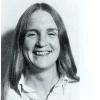 |
 |
Nadia Margolis
Ph.D. Stanford University
Field: French
Assistant Professor 1978-85
Before coming to Amherst as an assistant professor in Romance Languages (French) in 1978, I’d taken my Ph.D. at Stanford and then worked for the Mediaeval Academy of America in Cambridge, MA and the US Cycling Federation—medieval studies and international bicycle racing being my two main passions (I would teach the Tour de France and its cultural significance as one of the pivotal phases of my French Civilization course at Amherst). At Amherst I taught French language, literature (medieval through 19th century), and contemporary civilization. I also taught in the European studies and ILS programs, served on numerous committees, and was interim chair of French during my senior colleagues’ illness and leave.
After leaving Amherst in 1985, I was an associate professor in French and Comparative Literature at the University of Utah for four years, shouldering responsibilities similar to those at Amherst. I returned to the Amherst area for personal reasons, where I worked as an independent scholar, publishing books, translations and articles mainly on Christine de Pizan—the now well-known fifteenth-century poet, moralist and engagée writer dubbed by many the first feminist and certainly the first professional woman of letters—and Joan of Arc, primarily her literary-political symbolism in modern times. I have also been an attaché de recherché at the Centre National de Recherche Scientifique-section manuscrits humanistes in Paris (1978–2000); while in the US, I served on several NEH evaluation panels in Washington, DC. During the years 1990–2001, I lectured on Joan of Arc and Christine de Pizan and related topics at several universities in the USA, the UK, France and Switzerland, and also was consultant/ “talking head” for movies, radio and television. Since becoming widowed in 2001, I have been invited to teach and lecture at various universities, notably UC-Santa Barbara, UCLA, as distinguished visiting professor at Arizona State/Arizona Center for Medieval and Renaissance Studies, and currently, for the past five years, as Visiting Professor in French and Medieval Studies at Mount Holyoke College.
 |
Judith A. Davidson
M.A., University of Massachusetts
Field: German
Instructor, 1976-78; Assistant Professor 1978-82
Judith Davidson Chien started teaching German at Amherst College when she was still a doctoral candidate at the University of Massachusetts. After Amherst she taught briefly at the Massachusetts Institute of Technology, married Mark Chien and moved with her husband to Salem, Oregon. In Salem Judith was a librarian at Willamette University. She and Mark then moved to Lancaster, Pennsylvania, where Judith still serves as the Administrator of the Classics Department at Franklin and Marshall College.
 |
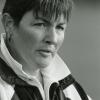 |
Michelle C. Morgan
M.S. Smith College, Amherst honorary degree 1990
Field: Physical education
Assistant Professor 1978-84; Associate Professor 1984-90; Professor 1990
I first experienced Amherst College as the sister of an Amherst student in the late 1960s. My first memories of the all-male bastion were my visits to Delta Upsilon (DU) fraternity which was the center of my brother’s life outside of the classroom. Little did I know that I would serve on the Amherst College Council in 1985 during the abolition of fraternities and the creation of a new social structure with an emphasis on “inclusion.”
Although offered biology teaching and coaching positions at some college preparatory schools after graduating from Colorado Women’s College in 1974 with a B.A. in Biology and French, I decided to pursue my M.S. in Exercise and Sport Science at Smith College. It is here in the “happy valley” that I began my college teaching and coaching career. During this time, just across the Connecticut River, Amherst College was undergoing the beginning stages of coeducation. My first job application and interview was for the first female assistant professorship in the Department of Physical Education and Athletics at Amherst. The all-male athletic department must have been worried about a young masters student potentially having inadequate experience to help them transition the athletic program to include women’s sports and was ultimately denied the position.
In retrospect, it was meant to be, as I became the Athletic Director, Physical Education and Health Educator and coach at the Vail Deane School in Elizabeth, NJ. The headmaster who hired me and the office secretary would soon become my in-laws! During my second year at Vail Deane, Amherst’s football coach Jim Ostendarp notified my brother Class of 1972 that a new search for an assistant professor in the athletic department would be advertised and expressed his hope that I would apply.
My dream of attaining a college teaching and coaching position came true and my husband gave up his job and we gleefully relocated to Amherst. Thirty-three years later having pioneered Amherst women’s athletics in its infancy I look back with fond memories of the challenges our department faced in the early stages of coeducation and where it has evolved to since those early days. I was first hired to teach in the physical education program and to coach the women’s soccer club in the fall, women’s squash in the winter and men’s junior varsity tennis in the spring. In addition, I was to assume the responsibility to ensure that the needs of our female students were first, being acknowledged and second, being met. I won’t share with you my starting salary but it was not much to live on!
Adding women’s intercollegiate teams was not the biggest challenge as most of the male coaches’ assumed an additional coaching assignment in a women’s program. Most involved what one might consider more trivial such as selecting uniforms, purchasing appropriate sport-related equipment and determining appropriate locker room space, the latter being the most basic of issues. Before my arrival, the department decided that the easy solution for locker room and shower space would be to divide the men’s locker room in half by installing a partition. The engineering appeared to me a little faulty upon my arrival as I discovered that curious young male students took the opportunity to peek into the women’s locker room because the partition was not built floor to ceiling. (In this day and age those students might be facing disciplinary action, but then was treated as simple boyish curiosity!)
One of my own early personal challenges was being asked to assume the responsibilities as head women’s basketball coach on the morning of November 1st, which was the opening day of the winter season. I was introduced that afternoon to a group of confident young female students as the new head coach and it was a bit daunting as I was walking in with no preparation and minimal basketball coaching experience. The support that I received from the athletic staff was a “God” send and I successfully finished two seasons with winning records. We may have had four fans in the stands, my loyal husband, Professor Frank Westhoff and Casey (the custodian of the DU fraternity) and his wife. Recently my nostalgia led to great pride in watching our 2010-11 women’s team win the NCAA Division III National Championship. It was truly a bittersweet moment !
I am very proud to have been part of the coeducational transition and to have worked with colleagues who were fully committed and honestly sensitive to the needs of the early classes of women. Thirty-three years later I am grateful for holding a full professorship and to be involved with so many talented students in a different type of classroom. I have also had the good fortune to serve on many faculty committees which has allowed me to be involved in many other aspects of the college and the relationships made with my colleagues on the hill will be everlasting.
 |
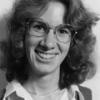 |
Elaine Louise Brighty
Ph.D. University of Illinois
Field: Biology
Assistant Professor 1979-82
After my B.A. from Smith College and Ph.D. in Biology from the University of Illinois, I taught Ecology and Evolution Courses at the University of Connecticut at Storrs. I came to Amherst College in 1979 as the first tenure-track woman in the biology department. Although I was re-appointed to a second three-year contract, I chose to resign my position in Spring 1982. I left academia, but I continued living in Amherst and I worked part-time for five years in Amherst College Admissions. I am married to Professor David Cox (AC Mathematics Dept.) and have two sons. Because one of my sons needed special education services, I became very involved with the Amherst Public Schools and served for almost 10 years on the Amherst School Committees as an elected member and chair.
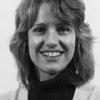 |
Lynn Frier Kaufmann
Ph.D. University of Pennsylvania
Field: Fine Arts
Assistant Professor 1979-81
Lynn Kaufmann joined the Amherst College faculty in 1979. Her previous positions included the University of Delaware, Montgomery County Community College, Temple University, the University of Pennsylvania and the Philadelphia Museum. She authored The Noble Savage: Satyrs and Satyrs Families in Renaissance Art in 1979. No further information is available.
 |
Carol Kay
Ph.D. Harvard University
Field: English
Assistant Professor 1979-83
Carol Kay graduated magna cum laude from Radcliffe College in 1967 and received her Ph.D. from Harvard University in 1975; her dissertation was on Philosophic Manners: David Hume. She taught English at Princeton and held faculty appointments at Amherst College, at Washington University, St. Louis and at New York University. In 1989 she joined the English faculty at the University of Pittsburgh. Kay wrote ''Political Constructions'' (Cornell University Press, 1988). Carol Kay died on Sept. 12, 1998 in Pittsburgh.
 |
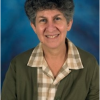 |
Ruth Stark
Ph.D. University of California, San Diego
Field: Chemistry
Assistant Professor 1979-85
After completing a two-year postdoctoral fellowship in Molecular Biophysics at M.I.T., I accepted my first faculty appointment in the department of chemistry at Amherst College in 1979. I followed Judith Herzfeld and Lila Gierasch as lone female faculty members in that department and was joined by Pat O’Hara in 1983. Despite a record of student teaching evaluations, external grant funding, and peer-reviewed publications that I remain proud of, I was denied tenure in 1984-85 and moved to The City University of New York’s Staten Island campus as associate professor in 1985. I have thrived professionally at CUNY, teaching hundreds of immigrants and first-generation college attendees, training fledgling scientists from high school through postdoctoral levels, and building a robust research program. We currently focus on the molecular structure and development of biopolymers that protect fruits and vegetables, the solution-state structure and regulatory mechanisms of nutritionally important fatty acid-binding proteins, and the molecular development of melanin pigments associated with human fungal infections. Designated as director of CUNY’s Institute for Macromolecular Assemblies in 2003 and distinguished professor of chemistry in 2006, I moved to CUNY’s City College of New York campus in 2007. I have served as interim dean of science at City College for the past year but hope to return to my professorial duties at the earliest possible date.
My husband (Abraham Malz) and I are the proud parents of a daughter (Aliza), an astrophysics geek who graduated from Hunter College High School (2006) and Caltech (2011). I am a terrible workaholic, but I keep myself amused in Manhattan with eclectic cultural events, stimulating conversation and scrumptious food.
 |
 |
Lisa Raskin
Ph.D. Princeton University, Amherst College honorary degree, 1991
Field: Psychology
Assistant Professor 1979-85; Associate Professor 1985-91; Professor 1991; John William Ward Professor of Psychology (Neuroscience)
I am jointly appointed in psychology and neuroscience at Amherst. My early research was in the area called “developmental psychobiology,” which studies brain development and its relation to emerging behavior with particular emphasis on animal models for childhood psychiatric disorders. Numerous published papers and book chapters came out of this work. After 15 years on the faculty I entered the administration, first as acting dean, then dean of the faculty for eight years, and acting president for a semester when the then president Tom Gerety went on sabbatical in 1999. I was the first female lab scientist to be tenured at Amherst (in 1984) and the first woman to serve as president of the college—if only as an actress! Being the dean of a predominantly male faculty put me in difficult situations at times, yet we made some important strides for women during my time, especially in the area of women in science. Plus, the demographics began to change significantly during this time towards a more equal gender balance on the faculty. I have no doubt that if our first woman dean, Catherine Bateson, hadn’t paved the way I would have suffered from being a woman in that position much more than I did.
In fact, arriving at Amherst in 1979 at the very young age of 25 (straight from graduate school at Princeton) I was fortunate to land in a truly nurturing department of psychology. Rose Olver and Buffy Aries became my instant friends, and this collegiality sheltered me from many difficult encounters that women were then enduring at Amherst.
After 20 years of laboratory research, I decided (while dean) to close my lab; I began to want to put psychology in the context of the history of science, the history of medicine, and the history of philosophy over the centuries. I now teach a class on the History of Psychiatry, and I am working on a manuscript relating to the history of and attitudes towards Electroconvulsive Therapy, particularly in Italy where it was discovered. I supervise many student projects on the history and culture of psychiatry.
I am also pursuing my lifelong interest in clinical psychology, in which I now teach a graduate class as a visiting professor at UMass. One great joy in my life over the past 6 years has been chairing the board of the Austen Riggs Center, a nonprofit residential psychiatric hospital for treatment-resistant patients in Stockbridge, Mass.
During the time the college committee was working on the report about working conditions for women I met David Sofield, the chair of that committee, but honestly, I didn’t notice him. We were later put on another committee together and I did notice him; the rest—as they say—is history; Reader, I married him. David and I have been married for 16 years. We have a lake house in New Hampshire, where we spend time in summer and fall; we spend some of every summer visiting my family in New Mexico, traveling to Europe, and seeing more family in New York City. I have two step-children and three step-grandchildren, a beloved nephew and niece, cousins I adore who live in Amherst (lucky me) and cats. We always have cats.
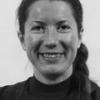 |
Danielle Johnson-Cousin
Ph.D. University of Illinois
Field: Romance Languages, French
Assistant Professor 1979-82
Danielle Johnson-Cousin joined the faculty of the French Department in 1979. She held positions at the University of Illinois, Urbana, Beloit College, Assumption College and the University of Alaska, Fairbanks. We have no further information on Dr. Johnson-Cousin.
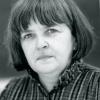 |
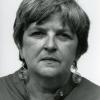 |
Helen L. von Schmidt
B.A., Amherst College
Field: English
Visiting Instructor 1979-80; Lecturer 1989-90; Senior Lecturer 1990-
Personal biography pending.
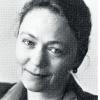 |
Mary Catherine Bateson
Ph. D. Harvard University, Amherst College honorary degree, 1981
Field: Anthropology
Professor 1980-87
I was 40 when I came to Amherst as dean of faculty, having taught at Harvard and Northeastern as well as overseas in the Philippines and Iran, and having shifted from linguistics to cultural anthropology. In Iran, I worked on the design of two new universities, so when I returned to the U.S. with our eight-year-old daughter during the revolution, I was hoping to find an institution where I could make a long-term commitment and it was clear that administration would be the logical course.
I have written about my experiences at Amherst College (1980-84). I enjoyed thinking of a whole institution as a system and made long-term friendships, but found most colleagues preoccupied with personal or departmental interests. On the whole, I have avoided administration since being at Amherst, although I did run a small foundation, the Institute for Intercultural Studies, for 30 years, partly as a vehicle for managing my parents’ literary estates.
At this point, I think of myself more as a writer than as a professor, although I was at George Mason University from 1987 to 2002, one of a group of distinguished university professors recruited for interdisciplinary interests and a commitment to undergraduate teaching. There I could take leaves without pay at will, which let me teach for a semester at Spelman College and three semesters at the Harvard Graduate School of Education while writing and pursuing other interests. I retired in 2002 and live in New Hampshire.
At seventy-one, still married, but now with a son-in-law and two grandsons, I continue to be interested in gender and other kinds of difference, including composing lives. My latest book deals with women and men in later adulthood as they continue to develop and contribute. Other interests include lecturing on the relationship between Judaism, Christianity and Islam and issues of the environment and climate change. I find myself fascinated by questions of trust, wisdom, and the possibility of cooperation across differences of all kinds. I remain busy and engaged but concerned about the future for this country and the world.
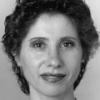 |
 |
Doris Sommer
Ph.D. Rutgers University, Amherst College honorary degree 1989
Field: Spanish
Assistant Professor 1980-83; Associate Professor 1983-89; Professor 1989-92
Doris Sommer joined the Amherst College faculty after teaching at Livingston College. Before moving to Harvard University, she spent a year at Cornell University. Sommer is currently the Ira Jewell Williams Professor of Romance Languages and Literatures and the Director of Graduate Studies in Spanish at Harvard University. Her interests include: 19th-century narrative in Latin American women's literature, ethnic literature and bilingual aesthetics.
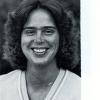 |
 |
Susan Zawacki
M.S. Ithaca College
Field: Physical Education
Assistant Professor 1980-93
I came to Amherst from Hamilton College, where I began my teaching, coaching and administrative career. Hamilton, a men’s college until 1978, merged with Kirkland College, a small liberal arts women’s college; I became the first women’s basketball coach at the newly formed co-ed institution. That experience prepared me for Amherst and its long-held male traditions. I immediately accepted the challenge to develop memorable experiences and traditions for the women who would soon call Amherst their alma mater. My time at Amherst was punctuated by the broad-based experience of the five-college system and the relationships with colleagues at Smith, Mt. Holyoke and UMass. Below is a brief overview of my career.
Senior Associate Director of Athletics Susan Zawacki began her tenure at the University of New Haven in 2000 and serves on the management team for developing departmental policy, as well as overseeing head coaches for a number of the Chargers' intercollegiate sports and the Sports Medicine Department. She coordinates the department's Performance Management Process, as well as the department's internal operations and projects, and oversees marketing and promotion of the department. She also serves on various university-wide committees, including a two-year term as the Chair of the Administrative Staff Council, with accompanying membership on the President's Council from 2004-06. She served on the University Affirmative Action Committee in 2005.
Prior to coming to UNH, Zawacki was the assistant director of athletics and assistant department chairperson at the University of Chicago from 1993 to 2000. She was also an associate professor of physical education. At Chicago, she was on the department's administrative group and helped establish policy, review gender equity issues and budget preparations. She served as the assistant director overseeing men’s varsity sports and also coordinated the fall preseason activities for seven different sports. She conducted the evaluation process for faculty and staff in the reappointment and promotion process and was the department of athletics liaison with admissions.
She helped implement a successful women's basketball program in the highly-competitive UAA conference; Zawacki won 93 games in seven seasons at Chicago, including a 19-7 mark in her best season in 1995 - capturing the only NCAA berth in school history that year.
Zawacki was the senior woman administrator, director of physical education and associate professor of physical education at Amherst College from 1980 to 1993. She directed the women's basketball and field hockey programs for 13 years, racking up 166 wins in basketball, including a 20-5 mark in 1988. She also implemented physical education curriculum, budgeted the undergraduate physical education program and helped cultivate alumnae at the previously all-male institution.
She started her intercollegiate athletics career as associate director of intramurals and instructor in physical education at Hamilton College from 1978-80. She coached the women's basketball team for two seasons. Overall, Zawacki won 288 games in 22 seasons as a women's basketball coach, with a .559 winning percentage.
Zawacki has served on a number of committees, including as national chairperson for the NCAA Division III Women's Basketball Committee from 1986-93. She was the regional chairperson from 1984-93, and has acted as on-site liaison at numerous regional and national NCAA tournaments. She was chairperson for the Frances Pomeroy Naismith National Award Committee from 1991-93 and from 1998-2000. She also served on NCAA regional committees for softball (2001) volleyball (2002-04) and currently chairs the East Region women’s soccer committee.
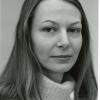 |
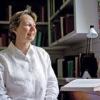 |
Rebecca Hague Sinos
Ph.D. Johns Hopkins University, Amherst College honorary degree, 1992
Field: Classics
Assistant Professor 1980-86; Associate Professor 1986-92; Professor 1992
I came to Amherst straight from graduate school, in the summer of 1980. Here was a place where I could teach courses drawing on my two areas of greatest interest, ancient Greek language and literature, and Greek archaeology. And the campus and town was surrounded by woods and fields, much like the small town in Maryland where I grew up. It all seemed then and still seems one of the best possible places for me to end up. I’ve had the opportunity to teach Greek courses in a great range of authors and genres as well as Greek archaeology, history, and mythology, and to make an occasional foray into teaching Latin. I was lucky in my first decade at Amherst to be able to teach a survey of European literature with Don White, a colleague in the German department, and several times with Bill Kennick, a colleague in Philosophy. And in recent years I’ve enjoyed working with Ned Nedeau as the faculty liaison to the Track and Cross Country teams. The range of things one gets involved with at a small college like Amherst, even faculty committee work, seems to me a good mix and a healthy antidote, or maybe rather accompaniment, to a tendency in academia to become ever more specialized.
When I first arrived at Amherst my research was concerned mostly with generic types of Greek poetry and the interaction between song and setting. This required the study of Greek ritual occasions, from weddings and funerals to festivals celebrating various gods. All of my research projects have unfolded from this focus on Greek ritual and religious practices. It isn’t as narrow a focus as it may sound, since there is no facet of life in ancient Greece to which religion is unconnected. It has brought me to study not only Greek writings of various kinds but also various ritual spaces and their architecture and architectural sculpture, and other kinds of artifacts associated with ritual, especially vase paintings. Most recently I’ve been working on a cult space in the center of Athens where a goddess called simply “the Mother” presided over the archives of the Athenian state.
 |
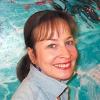 |
Lorraine Shemesh
M.F.A. in Painting, Tyler School of Art, Temple University
Field: Fine Arts
Assistant Professor 1980-81
I came to Amherst College as a tenure track assistant professor of fine arts in the fall of 1980, after serving seven years on the faculty of the Rhode Island School of Design, which followed a graduate fellowship in Rome, Italy. My work teaching studio courses in both painting and drawing was extremely rewarding. I left Amherst, however, after only one year and moved to New York City to make my way as a painter. I was asked to join the Allan Stone Gallery, where my work has been shown in solo exhibitions ever since. A retrospective of my paintings and drawings took place in 2006 at The Butler Institute of American Art in Ohio. My work has also been exhibited at the San Francisco Museum of Modern Art, the Frye Art Museum in Seattle, National Academy of Design Museum in New York City, Musee de Carouge in Switzerland, the Museum of the City of New York, Duke University Museum of Art and Tryon Center for Visual Arts in North Carolina, the Arnot Art Museum, the Boise Art Museum in Idaho, the Akron Art Museum in Ohio, the DeCordova Museum in Massachusetts, the Alpha Gallery and Institute of Contemporary Art, both in Boston, and the Museum of the Rhode Island School of Design, among others.
I have received a Rhode Island State Council for the Arts Grant in Painting (1979), a Yaddo Fellowship (1981), a Distinguished Alumni Award-Visual Arts from Boston University (1992), and was elected to membership in the National Academy of Design in New York City by my colleagues in 2005. My work has been reproduced/reviewed in The New York Times, The New Yorker, Art in America, Harper's Magazine, Drawing: Space, Form and Expression, Art & Auction, and in the Harry Abrams book, American Realism - 20th Century Drawings, among others and is represented in public and private collections throughout the U.S. and Europe.
My current studio work also includes clay, exploring the Japanese technique, Neriage. Today, I live with my husband in a large loft in mid-town Manhattan, overlooking the Empire State Building.
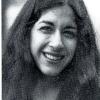 |
 |
Amrita Basu
Ph.D. Columbia University, Amherst College honorary degree, 1994
Field: Political Science and Women's and Gender Studies
Assistant Professor 1981-88; Associate Professor 1988-94; Professor 1994; Domenic J. Paino 1955 Professor of Political Science and Women's and Gender Studies
I began teaching in the political science department at Amherst College in 1981. Before that I was a graduate student at Columbia University. I became a member of the newly formed Women’s and Gender Studies department after receiving tenure and have maintained a joint appointment in the two departments.
Much of my research addresses women and gender. I published a book based on my dissertation research on women’s activism in India. I have edited two anthologies on global women’s movements. My current area of interest is religious nationalism in India and I have written on religious right wing women in India. I teach courses on social movements, human rights, women’s activism and post colonial nationalism. I appreciate the freedom I have had to teach about the issues that most interest me and love teaching at Amherst.
I got married a few years after coming to Amherst and my husband and I raised two sons here. They are now 22 and 24 years old.
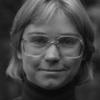 |
Kris Hallberg
M.S. University of Wisconsin
Field: Economics
Assistant Professor 1981-82
After leaving Amherst, Ph.D. University of Wisconsin, Madison
I came to the economics department at Amherst directly from graduate school, still a year away from completing my Ph.D. dissertation. I had been job-searching jointly with my husband, Bill O'Neil (Amherst grad '73), also Ph.D. in economics from Wisconsin, and we were finding it difficult to find offers in the same place at the same time. When Amherst offered me a tenure-track position, they gave Bill a one-year visiting position to fill in for Ralph Beals, who was on sabbatical. I think I was the first woman to be on tenure-track in the economics department, but I'm not sure.
Getting my first year of teaching experience at Amherst was great because I had so many good examples to learn from. It was especially helpful to team-teach the introductory economics course. I don't remember feeling that I didn't fit in because I was female, but being in the field of economics I was pretty used to working mainly with men. I probably felt more out of place because of my Midwestern middle-class background.
After Amherst both my husband and I taught at Colby College for several years. I took a pre-tenure sabbatical to teach econometrics at the Universidad de los Andes in Bogota, Colombia, and then left academics to join the World Bank where I worked as a staff economist for 20 -- mostly in Latin America but also in East Asia, Europe and Central Asia, and Africa. I'm still with the bank but now as a consultant, working remotely -- really remotely -- from a log cabin on a lake in northern Minnesota.
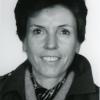 |
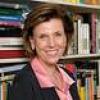 |
Ute Brandes
Ph.D. Harvard University
Field: German
Visiting Assistant Professor 1982-83; Assistant Professor 1983-88; Associate Professor 1988-93; Professor 1993; Georges Lurcy Professorship 2009
I’m among the “younger” of the pioneer women at Amherst, having come to teach here only in 1982. I had just received my Ph.D. at Harvard University. For me, that year, it was either to teach here or to be unemployed: Amherst College had the only position in German Studies available within driving distance from Exeter NH, where I lived with my family. I was tremendously happy to get the job. My two boys were 16 and 14 years old then, and I needed to be with them and with my husband—at a minimum on the weekends.
My life has been deeply enriched by teaching and writing at Amherst College. Having grown up in East Germany, I had studied Russian for six years in school, and I only learned English after coming to the U.S. in 1964. I had an enormous need to understand what it meant to live in America and in the West. Therefore, I started college at the University of New Hampshire as soon as I could read and speak English. When I came to Amherst, I went to many lectures and concerts here and at the other Valley colleges, and I was excited about the rich educational opportunities open to all. I did not much reflect on the gender imbalance we, the pioneer women, encountered at Amherst—it seemed normal in my experience. My secret mentor was Rose Olver. I admired her calm, her personal tact and great institutional knowledge when talking to colleagues, to the administration, and to trustees; her immense professionalism in her field; and the personal empathy she somehow naturally radiates. I wanted to be like her. When the faculty voted to found our WAGS department, I felt as if it was a personal accomplishment of mine. Yet it was hers and her collaborators.
Over the years, my teaching made me often feel excited and happy; my research continues to be enormously enriching. One of my best honors was to receive the Georges Lurcy Professorship in 2009, the first to be awarded to an Amherst professor. My husband lives in Amherst now. Our two sons have become very accomplished in their fields. Amherst College has been wonderful for all of us.
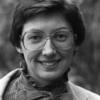 |
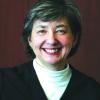 |
Yolanda K. Kodrzycki (Henderson)
M.A. University of Pennsylvania
Field: Economics
Assistant Professor 1982-86
Later earned a Ph.D. from University of Pennsylvania
After three years as an assistant professor in the economics department, I spent my junior leave year (1985-86) as a visiting scholar in the research department of the Federal Reserve Bank of Boston. I was offered a permanent position at the Boston Fed, which I accepted for both personal and professional reasons. Amherst had been a long commute from my home in the Boston area, and I longed for a better consolidation of my work and non-work lives. Little did I expect that my marriage would break up shortly after I switched jobs. The Boston Fed offered (and still offers) colleagues who have a strong interest in how economics can address current-day policy issues, and among them are a critical mass of women economists. During the 1970s and 1980s, economics remained a very male-dominated profession―especially in academia. I had never been taught by a female economics professor during either my graduate or undergraduate years!
In the early days of my career, I studied how national tax policy affects the allocation of resources in the economy. I subsequently became less of a specialist, and I currently describe myself as an applied microeconomist with a particular interest in regional, labor market, and public sector issues. My research has covered diverse topics, including economic development strategies for older industrial cities, the long-term implications of job loss, the migration patterns of college graduates, causes of regional differences in educational attainment, privatization of government functions, and corporate tax policy at the national and state levels. In the early 1990s, I took a leave from the Boston Fed to live in Warsaw and consult for the U.S. Treasury’s advisory program in Central and Eastern Europe. More recently, I have been a senior contributor to “Toward a More Prosperous Springfield,” an ongoing multi-year commitment by the Boston Fed to support the revitalization of that city. In 2010, I was promoted to vice president and director of the New England Public Policy Center at the Federal Reserve Bank of Boston. In that role, I plan and oversee research that contributes to the development of sound public policy in New England, especially in the areas of labor market and demographic challenges and state and local public finance. I enjoyed the opportunity to reconnect with Amherst this past year, when associate professor of economics Jessica Wolpaw Reyes joined the Policy Center as a visiting scholar. I’m thrilled to be included in the college’s recognition of its pioneer women faculty and hope to form closer ties with this group and others who join us in reflecting on those years.
On the personal front, I have remarried and reverted to my birth name (Kodrzycki). My husband and I are the proud parents of a high school junior who will soon be starting her college search.
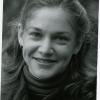 |
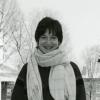 |
Stephanie Sandler
Ph.D. Yale University, Amherst College honorary degree 1995
Field: Russian and Women's and Gender Studies
Visiting Assistant Professor 1981-84; Assistant Professor 1984-89; Associate Professor 1989-1995; Professor 1995-2000
I came to Amherst in 1981 as a half-time two-year visiting assistant professor. Mt. Holyoke College appointed me to teach two courses per year, also, so that in that year when academic jobs were scarce, I was fully employed. This split arrangement extended into a third year, and after that, I was miraculously given a full-time tenure track appointment. Starting off in this fairly marginal, temporary position gave me a sense of distance on the college, which was probably very good for my mental health! And it kept my focus on my scholarship in a way that might have been unusual for people in their first job. I made some good friends in women’s studies departments outside Amherst and was active in Five College Women’s Studies, which also shaped my research. I happily taught courses in Russian language and literature, and helped create the department of women’s and gender studies. I prized Amherst’s willingness to let me teach outside my supposed areas of expertise. I was lucky to have exceptional students, several of whom have gone on to become fine literary scholars. In 1998, I was offered a job in the Harvard Slavic Department. It took me a very long time to decide to leave Amherst, but it has mostly been a good next step for me. I have had remarkable graduate students and gotten to teach many new kinds of courses. There are days when the commute feels like some terrible punishment, but I get to live in Amherst, and to stay in touch with wonderful friends from my years of teaching at the college. My scholarship has changed a lot over the years, in ways I could not have predicted, from writing about Pushkin and the early nineteenth century, to work on issues around gender and sexuality in Russian culture. In the last decade, I have concentrated on contemporary poetry. The years of work with feminist theory and in WAGS left me with a lasting foundation and inner focus. Translating poetry has been increasingly important to me, as has a strong interest in contemporary American poetry. I am married to Austin Sarat, and in addition to our two grown daughters from his first marriage, we have a fifteen-year-old son, Ben.
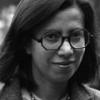 |
Greta Nachtailer Slobin
Ph.D. Yale University
Field: Russian
Assistant Professor 1981-87
Greta Slobin grew up in Russia and Poland, emigrating to the U.S. in 1960. After receiving a doctorate from Yale University in Russian literature, she taught at Wesleyan University, Amherst College and the University of California at Santa Cruz, from which she retired as a full professor. Ms. Slobin died in May, 2011 in Middletown, Connecticut.
 |
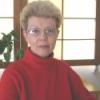 |
Beth Yarbrough
Ph.D. University of Washington
Field: Economics
Assistant Professor 1982-88; Associate Professor 1988-93; Professor 1993; Willard Long Thorp Professor of Economics
I came to Amherst as an assistant professor of economics in the Fall of 1982. My husband, Robert, and I were completing our Ph.D.s in economics at the University of Washington in Seattle and my degree was awarded midway through my second year at Amherst. I was the first woman in the economics department to stay long enough to stand for tenure (in 1987) and was the only tenured woman in the department until 2008 when I was joined by Jessica Wolpaw Reyes '94.
My research and teaching focus on international trade, the economics of international political relations, and the economics of organization. I’m proud to have developed a diverse and multidisciplinary research agenda that draws on economics, political science, international relations and law. My international economics textbook, The World Economy (co-authored with Robert), is now in its seventh edition and is used at many colleges and universities in the United States and abroad as well as in several of my own courses at Amherst. Robert and I spent an intellectually exciting year as visiting scholars in economics at Berkeley and visiting scholars in political science at Stanford while working on our book, Cooperation and Governance in International Trade. I’ve served as a member of the Editorial Board, review-essay editor, associate editor, and senior advisor to the editor for International Organization, widely recognized as the world’s leading journal of international relations and international political economy. I’ve also worked closely with the founders of the multidisciplinary Journal of Bioeconomics, and I serve on that journal’s International Advisory Board.
The college’s support of my research stands out as the institutional bright spot in my 30-year career in the economics department. That support allowed me to establish a network of wonderful professional colleagues around the world, both male and female, whose generosity and collegiality helped compensate for the institutional deficiencies I’ve experienced as a pioneer female economist at Amherst.
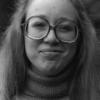 |
 |
Linda K. Caron
Ph.D. Bryn Mawr
Field: Fine Arts
Visiting Assistant Professor 1981-82; Assistant Professor 1982-88
Linda Caron joined the Amherst faculty after completing her Ph.D. in the history of art at Bryn Mawr College. She moved to Wright State University in Dayton, Ohio in 1988 and was promoted to chair the Art Department in 1993. Caron is currently professor of art history and associate dean of the College of Liberal Arts at Wright State.
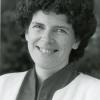 |
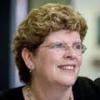 |
Patricia B. O'Hara
Ph.D. Columbia University
Field: Chemistry
Assistant Professor 1983-89; Associate Professor 1989-95; Professor 1995; Amanda and Lisa Cross Professor of Chemistry
I came to Amherst College in 1983 after a two-year post-doctoral appointment at Stanford University during which time my husband, Rich Blatchly, and I lived in San Francisco. Our two girls, Sarah and Becca were born and raised here in Amherst. Sarah has just graduated from Bryn Mawr College and Becca is at Colby College. I love to travel and look back fondly to the year my family and I lived in Bordeaux, France. My research work at Amherst has focused on using fluorescence to measure and monitor biological change. We have worked on calcium-binding proteins, antibodies, estrogen receptors, polymerase enzymes, DNA snap polymers, self-folding polymers, and most recently, fluorescent bananas. I love teaching, especially my bookends courses where I teach First Years and Upper Class Students. Over the 30 years I have been here, I have taught courses in Intro Chemistry, Biochemistry, Physical Chemistry, Molecular and Cellular Biophysics, and I have developed new courses in Chemical Basis of Biological Processes and a brand new course to be taught this fall in Case Based Biochemistry. I have taught First Year seminars in Evolution and Revolution and Genes, Genomes, and Society and Bruss Seminars in Minorities and Women in Science and Medical Risk Assessment. I just started an amazing collaboration with a team of scholar/teachers in Turkey to teach a summer course on the Chemistry of Olives. Recently, I began a three-four year rotation in the Dean of Student’s Office as dean of new students. I enjoy working with the amazing staff there.
 |
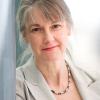 |
Penny D. Sackett
M.S. University of Pittsburgh
Field: Physics
Visiting Assistant Professor 1983-85
I joined the physics faculty at Amherst in 1983 with my Ph.D. research in field theory complete, but the thesis not yet submitted. In the summer before the beginning of the 1984/85 academic year, I submitted my Ph.D. thesis and have always been grateful to the college for supporting my appointment in that first year when I was writing.
Educated in large public institutions, I found Amherst College a new and sometimes bewildering experience, and my academic life was enriched by exposure to team teaching and cross-disciplinary courses. In particular, I remember the camaraderie with other "freshman" faculty members, the challenge of preparing lecture notes for more than one new course simultaneously, and team-teaching a course on "Race and Sex" with several Amherst notables, including Mary Catherine Bateson. Other courses I taught at Amherst included Introductory Physics, Electronics, and Thermodynamics and Statistical Mechanics.
After leaving the college, I continued my career at the Institute for Advanced Study in Princeton, and the Kapteyn Astronomical Institute, where my work centred on applying physics to the structure of galaxies, galactic dark matter, and the search and characterisation of extra-solar planets, including the discovery of one of the first known Earth-mass planets orbiting another star. My early career also included reporting for Science News magazine and program administration for the National Science Foundation.
In 2002, I became director of the Research School of Astronomy and Astrophysics, and Mt Stromlo and Siding Spring Observatories at the Australian National University (ANU), where it was my honour to assist in rebuilding the school after most of its facilities were destroyed six months after I arrived in a horrific bush fire. I have just recently completed a period as chief scientist for Australia, advising the government of Australia on matters of science, technology and innovation, focusing on evidence-based decision making, sustainability and the long view. Currently, I am seeking other ways to contribute that will combine my passions for communication, cross-disciplinary work and science while retaining the title of professor at the ANU. Recently, the art and science of ceramics has entered my life, as well as a delightful and clever first grandniece.
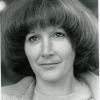 |
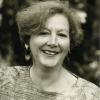 |
Sigrit Schutz
Ph.D. Five Colleges
Field: German
Visiting Assistant Professor 1983-84; 1985-86; 1987-88; 1989-90; Visiting Lecturer 1990-93
I came to Amherst College for the first time as a sabbatical replacement. I had quit a tenure track position at a women's college in the neighborhood due to personal problems in that department. I had started to study for an MBA and was ready to quit the profession when Helene Scher, chair of the German Department, called me, and asked me to fill in for one semester. I loved teaching at Amherst and eagerly agreed when another sabbatical replacement was needed the following year - and the next, and the next. I loved my students and I loved my colleagues, and I was happy to teach for many years with one-year contracts. Our wonderful Dean Lisa Raskin decided that the college was exploiting me and changed my position to a lecturer's position which eventually became a senior lecturer position. At the end of this academic year I will hang up my cap and gown, but I will look at teaching in the German Department at Amherst College as one of the most important, enjoyable, and stimulating parts of my life.